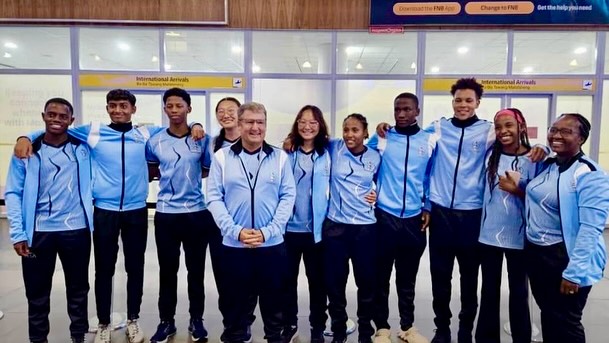With a population of 112.7 million, Egypt clinched the lion’s share of gold medals, followed by South Africa, boasting a population of 60.6 million, in second place. With its landlocked geography, a population of 2.6 million and a nascent history of swimming that only began in 2004, Coach Craig Rouse is contented that Botswana still made a splash in the international aquatic arena
GAZETTE REPORTER
In the aquamarine battleground of the 15th Africa Aquatics Junior and Open Water Swimming Championships held in Mauritius from 6 to 10 December 2023, Botswana’s Swimming Sport Association (BSSA) had a squad of 11 of the nation’s finest aquatic contenders.
The stage was set and expectations were high for the rising stars of Botswana’s nascent swimming programme.
Craig Rouse, the seasoned coach who was at the helm of the Botswana swimming contingent, acknowledged the mixed bag of outcomes. “The performance could have been better, but several swimmers showcased stellar Personal Bests (PBs),” Rouse reflected.
Choppy waters
The athletes, however, found themselves navigating choppy waters, with their preparations hampered by the undertow of academic commitments. “Most of them have been engrossed in rigorous study sessions and crucial exams over the last two months, impacting their training schedules,” Rouse noted.
The competition bore witness to the resilience of Botswana’s aquatic talents, who, despite the hurdles, carved ripples in the pool of international competition. Rouse’s insights into the challenges faced by his team underscore the unique journey of Botswana in the realm of competitive swimming.
“Swimming in Botswana began as recently as 2004, with only a handful of pioneers venturing into the waters,” he pointed out. “We’re a nation still finding our stroke in this domain.”
One of the defining challenges faced by Botswana on this aquatic battleground is the stark contrast in swimming legacy and resources. Rouse noted the giants of the pool – Egypt, with a population of 112.7 million, clinching the lion’s share of gold medals, and South Africa, boasting a population of 60.6 million, securing the second position.
Uncharted waters
“Many African nations have had swimming programmes in place for the better part of a century, providing them a head start. In comparison, Botswana is navigating uncharted waters, striving for excellence with limited history in the sport,” explained Rouse.
These competitions, however, hold profound significance for both the BSSA and the swimmers. Beyond the pursuit of medals, they offer a platform for exposure on a grander stage, an opportunity for Botswana’s swimming talent to make a splash in the international arena.
Said Rouse, echoing the aspirations of his team: “For us, every competition is a learning experience, a chance to grow and refine our skills. It’s about placing Botswana on the swimming map, one stroke at a time.”
Aquatic trailblazers
As the waves of competition recede and the swimmers return to the shores of Botswana, the journey continues for these aquatic trailblazers. The 15th Africa Aquatics Championships may not have seen Botswana claim the top spot, but the spirit, determination, and burgeoning talent displayed by the swimmers tell a story of a nation charting a new course in the vast expanse of international swimming.

